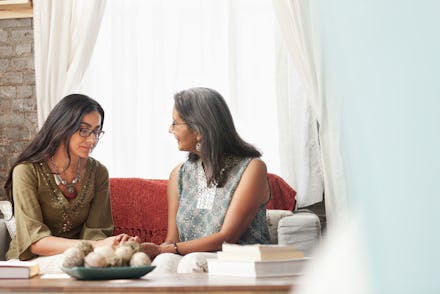Why is it so hard to convince your parents to stay inside during a pandemic?

As we all hunker down, #stayhome, and run through cases of cheap wine, many of us are spending a lot more FaceTime with our parents and other assorted elders in the family. Some of these conversations consist largely of the younger, more media-obsessed and perhaps overly informed party lecturing a less concerned older party about coronavirus safety. Weirdly, a lot of us are finding ourselves in a Freaky Friday-esque role reversal; we’re the worried parent trying to keep these 60-something mischief-makers out of harm’s way. For some of us, trying to convince our parents that they should be socially distancing during the coronavirus outbreak is a jarring reality.
“It took a solid week of ranting from both myself and my sister, a nursing professor, to get our immunocompromised mom to stay home,” Abby Mulcah a public health grad student in Oregon, tells me. “She was able to convince our dad a couple days later. My 90-year-old grandma was the worst. We finally got her to stop going to church on Friday (she goes daily). My aunts and uncles are a lost cause.” Frustrated and understatement to describe Mulcah in this moment; her studies center around disaster preparedness in public health, and she feels like her extensive knowledge of how to respond to situations like the coronavirus pandemic are being ignored by her family.
“I have and have had so much rage,” Mulcah says. “I think there’s an inherent power dynamic problem that leads to them not listening. Suddenly everybody’s kids are the experts and that just does not fly, especially amongst my conservative catholic ex-military family.”
Mulcah’s observations about this power dynamic is on point. “It’s a role-flip,” says Aimee Daramus, a Chicago-based psychotherapist. “Parents are not used to taking orders from us or feeling like we’re taking care of them. They’re used to being the ones who have it handled so we don’t have to. It’s probably also making them feel older and more vulnerable.” Any parent-child dynamic is complicated, but what most of them have in common is that the parent takes care of the child. This role reversal is, psychologically, a difficult switch for parents to make.
“My parents are incredibly sheltered,” says Kat Miller, a restaurant worker in Boise who prefers not to use her real name for this article to keep the peace in her family. “They only really leave their brand new affluent upper middle class neighborhood to run errands. The only true exposure they get to the outside world is through Facebook, church, and the talking heads on conservative news networks.”
This limited news intake, Miller says, is affecting the way her parents respond to the COVID crisis. “My dad is flying back from Vegas today after having attended my aunt's interment in CA,” Miller says. Since he was traveling, she says that he also decided to casually attend, “a fucking car show with however many other senior citizens.” Miller says that she feels spiteful and angry, but also sad. Miller found herself in the unlikely position of trying to console and nurture her. “And I wasn't mad at her any more, I was mad at the world. It was like she had become the scared child, and now that the world was seemingly falling apart she was too.”
The young folks I spoke with were really concerned about the ways their parents are putting themselves, and others, at risk. “My parents are both still going out,” Julia Marshall, an artist in New Orleans, tells me. “I wish they’d just take up playing the sims and watching Netflix. It’s a little ironic that the group most likely to be hospitalized is also the most likely to be roaming the streets.” Marshall says that she thinks her parents reluctance to take COVID seriously belies a combination of generational issues that people their age — people in their 50s and 60s — are now facing. “They can no longer tell us with a straight face that America is doing things the best way,” she says.
What can young people facing this script-flip do to find their chill? “There’s only so much you can do,” Daramus explains. “Your parents, who would have lost their minds if you got arrested, are now ignoring what authority figures are saying? Strange times. Just protect yourself and your partner and children if you have them.” Daramus suggests that folks who are struggling through this convo try to let the political divide slide and focus on the personal. “If you present it as a rule or a good person/bad person issue, it will just put up walls,” she says.
Daramus suggests leading the conversation in a way that lets parents come to their own conclusions. “Tell them you hope people are being careful around an elderly neighbor, or mention an immuno-compromised friend who ends up in the hospital all the time. Make it emotional and personal so that your parents want to protect people. Maybe find a role model they respect who’s doing the right things.”